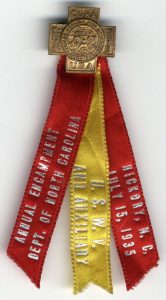“In the North, a feminization of teaching had already occurred in the antebellum era, but… in North Carolina in 1860 only 7 percent of teachers were women. During the war this proportion rose significantly, until by the end of the conflict there were as many female as male teachers in the state….
“As Calvin Wiley, superintendent of common schools for North Carolina, noted in 1862, ‘Many ladies are compelled by the circumstances of the times to labor for a living; and there is no employment better suited to the female nature, and none in which ladies can labor more usefully, than in the business of forming the minds and hearts of the young’….
“J. K. Kirkpatrick, president of Davidson College, perceived a parallel between male soldiers and female teachers — and anticipated some of the same parental resistance to sending daughters to the classroom as sons to battle: ‘You have made your sons an offering on your country’s altar. Would you withhold your daughters from a service, noble in itself, and befitting their sex, without which their country must be subjected to a yoke more disgraceful and oppressive than that our ruthless enemies would lay upon our necks — the yoke of ignorance and its consequences, vice and degradation?’ ”
— From “Mothers of Invention: Women of the Slaveholding South in the American Civil War” (1996) by Drew Gilpin Faust

